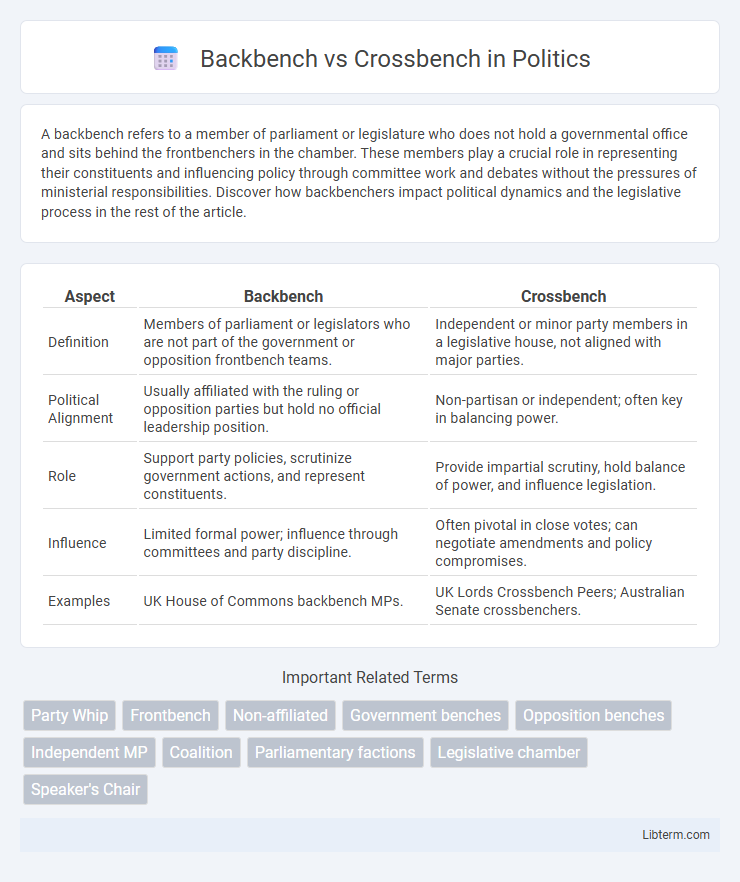A backbench refers to a member of parliament or legislature who does not hold a governmental office and sits behind the frontbenchers in the chamber. These members play a crucial role in representing their constituents and influencing policy through committee work and debates without the pressures of ministerial responsibilities. Discover how backbenchers impact political dynamics and the legislative process in the rest of the article.
Table of Comparison
| Aspect | Backbench | Crossbench |
|---|---|---|
| Definition | Members of parliament or legislators who are not part of the government or opposition frontbench teams. | Independent or minor party members in a legislative house, not aligned with major parties. |
| Political Alignment | Usually affiliated with the ruling or opposition parties but hold no official leadership position. | Non-partisan or independent; often key in balancing power. |
| Role | Support party policies, scrutinize government actions, and represent constituents. | Provide impartial scrutiny, hold balance of power, and influence legislation. |
| Influence | Limited formal power; influence through committees and party discipline. | Often pivotal in close votes; can negotiate amendments and policy compromises. |
| Examples | UK House of Commons backbench MPs. | UK Lords Crossbench Peers; Australian Senate crossbenchers. |
Understanding Parliamentary Benches: Backbench vs Crossbench
Backbenchers are members of parliament who do not hold ministerial or shadow ministerial positions and typically sit behind the frontbenchers in party-specific seating areas, representing their party's rank and file members. Crossbenchers, in contrast, are independent or minor party members who occupy seats positioned between the government and opposition benches, often playing a crucial role in balancing power in closely divided parliaments. Understanding these distinctions clarifies the dynamics of parliamentary debate, voting behavior, and the influence of non-executive legislators in shaping policy outcomes.
Defining Backbenchers: Roles and Responsibilities
Backbenchers are Members of Parliament who do not hold ministerial or shadow ministerial positions, primarily responsible for representing their constituents and contributing to debates and committee work. Their roles include scrutinizing government policies, influencing legislation through questions and motions, and holding the executive accountable. Backbenchers also serve as a vital link between the public and government, ensuring local issues are raised within parliamentary discussions.
Who Are the Crossbenchers? A Comprehensive Overview
Crossbenchers are independent or minor party members in the UK House of Lords who do not align with the government or opposition parties, offering impartial perspectives on legislation. They include life peers appointed for their expertise in areas such as law, science, and the arts, as well as bishops and hereditary peers elected by their peers. Crossbenchers play a crucial role in scrutinizing government policies and providing balanced, non-partisan contributions during debates and committee work.
Historical Origins: How Backbenches and Crossbenches Emerged
Backbenches originated in the British parliamentary system as seating behind government ministers, representing MPs without ministerial office, symbolizing their rank in legislative hierarchy. Crossbenches emerged in the House of Lords to accommodate independent or non-affiliated members sitting between government and opposition benches, highlighting their neutral stance. The distinct placements reflect historical developments in parliamentary organization and political representation.
Key Differences Between Backbench and Crossbench Positions
Backbench positions refer to members of a political party who do not hold governmental office or shadow cabinet roles, typically sitting behind the frontbenchers in parliamentary seating. Crossbench positions are occupied by independent or minor party members who do not align with the major party benches, offering impartial and non-partisan contributions in legislative decisions. The key difference lies in party affiliation and roles: backbenchers support party policies while crossbenchers act as neutral arbiters or hold balance-of-power positions in parliamentary votes.
Influence on Legislation: Backbench vs Crossbench Impact
Backbenchers influence legislation by voting within party lines, often supporting government bills or opposing opposition initiatives, which can solidify or challenge the ruling party's agenda. Crossbenchers, independent or minor party members, hold pivotal power in closely divided parliaments by casting decisive votes and negotiating amendments, significantly shaping legislative outcomes. Their role enhances parliamentary scrutiny and introduces diverse perspectives that can lead to more balanced and representative laws.
The Importance of Independence: Crossbenchers’ Unique Role
Crossbenchers play a crucial role in legislative bodies by maintaining independence from political party constraints, allowing them to vote based on merit and evidence rather than party lines. Their position enhances parliamentary debates by offering unbiased perspectives that bridge government and opposition divides, fostering balanced decision-making. This unique independence ensures that diverse viewpoints are represented, contributing to more nuanced and effective lawmaking.
Party Loyalty and Rebellion: The Backbencher’s Dilemma
Backbenchers often face a critical tension between party loyalty and the temptation to rebel, challenging their political careers and constituency interests. Crossbenchers, unlike backbenchers, operate with greater independence, free from strict party discipline, allowing them to vote and speak according to personal or constituent beliefs without risking party sanctions. This distinction highlights the backbencher's dilemma: balancing allegiance to party leadership against the need to represent diverse voter priorities, often leading to strategic voting or subtle dissent within party lines.
Recent Examples: High-Profile Backbenchers and Crossbenchers
High-profile backbenchers like Sir Keir Starmer in the UK Parliament have played crucial roles in scrutinizing government policies and shaping party strategy outside the cabinet. Recent crossbenchers in the House of Lords, such as Lord John Kerr and Baroness Helena Kennedy, have influenced key debates on constitutional reform and human rights, offering non-partisan expertise. The increased visibility of backbenchers and crossbenchers underscores their growing impact on legislative scrutiny and public policy development.
Future Trends: The Evolving Roles of Backbench and Crossbench Members
Backbench and Crossbench members in parliamentary systems are increasingly involved in shaping legislative discussions through digital platforms and social media engagement, redefining their traditional roles. Future trends indicate a growing influence of Crossbench independents in driving policy innovation and bipartisan cooperation, while Backbench MPs leverage constituency data analytics to better represent local interests. Technological advancements and shifting political landscapes are expected to enhance the accountability and responsiveness of both Backbench and Crossbench members in future legislatures.
Backbench Infographic

 libterm.com
libterm.com